Key takeaways:
- Adhering to coding best practices enhances maintainability, collaboration, and confidence in code quality.
- Effective coding relies on consistent naming conventions, modular code, and thorough documentation to prevent confusion and errors.
- Utilizing tools like version control systems, code linters, and automated testing significantly improves the coding process and project outcomes.
- Continuous learning through feedback, attending events, and community engagement fosters personal and professional growth in development.
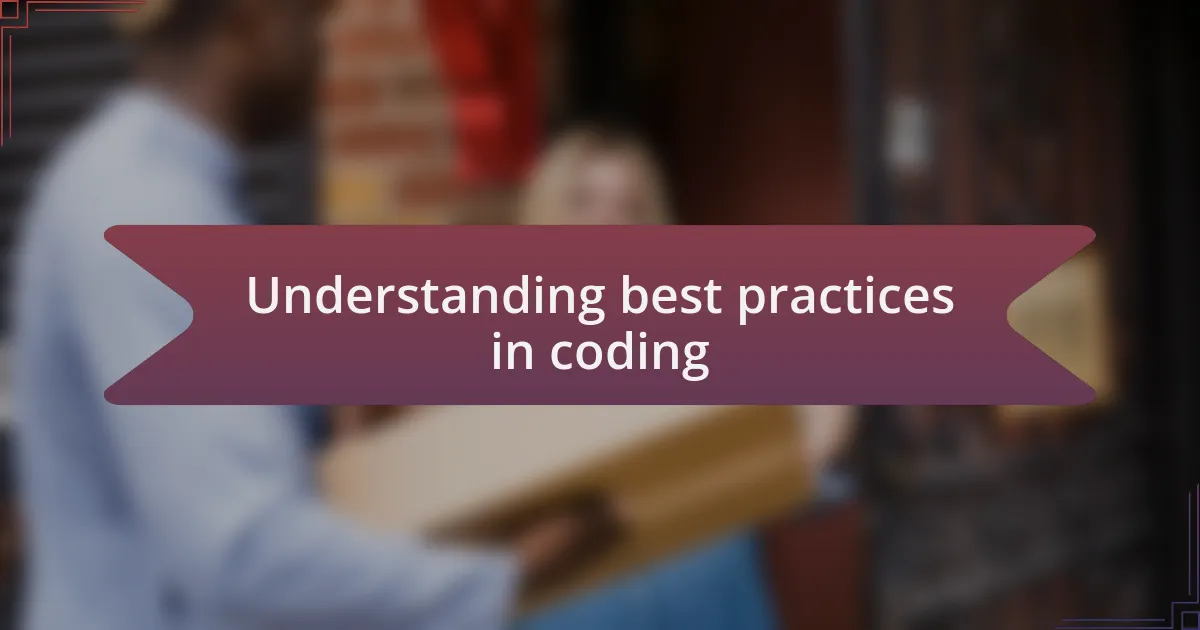
Understanding best practices in coding
Best practices in coding are essentially the guidelines that promote writing high-quality, efficient, and maintainable code. I vividly recall my early days of programming when I would sometimes overlook these principles, only to face the consequences later. For instance, I learned the hard way that not commenting my code often led to confusion, not just for others, but for my future self. Have you ever spent hours debugging code you’ve written, only to realize it was a simple issue that could have been avoided with clearer structure and comments?
The importance of consistency in coding can’t be overstated. I remember working on a project where the team adopted a specific naming convention, and as a result, our collaboration improved significantly. It made reading and understanding each other’s work seamless. Think about it—how much easier is it to navigate through someone’s code when they follow the same rules you’ve set?
Moreover, embracing best practices often reveals the beauty of coding as a craft. I enjoy taking a step back and appreciating how well-structured code can be almost poetic. It’s not merely about functionality; it’s about elegance too. When was the last time you stepped back and admired your code? I believe that when I apply best practices consistently, it’s not just about being a better developer; it’s about fostering pride in my work.
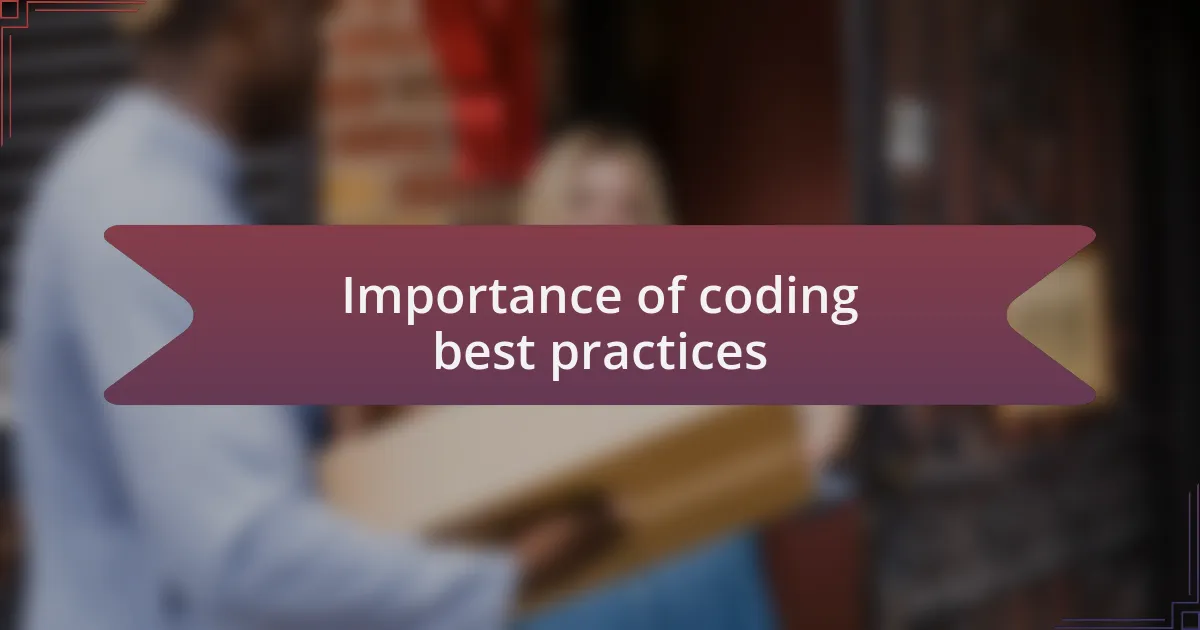
Importance of coding best practices
Maintaining coding best practices is crucial because it directly impacts the maintainability of a project. I’ve been part of teams where lack of adherence to these guidelines resulted in a codebase that felt like a tangled ball of yarn. There was a point when I struggled to unravel the logic behind a feature we were trying to improve; if we had followed best practices, that confusion could have been avoided altogether.
Another significant aspect is enhancing collaboration among team members. I remember a project where inconsistent coding styles created frustration. It dawned on me that when we align on best practices, it’s like speaking the same language. Have you ever had to decipher someone else’s code feeling like you were trying to translate a foreign text? Consistency makes it easier for everyone to pitch in effectively, leading to a more cohesive and productive team environment.
Perhaps the most rewarding part of coding with best practices is the confidence it instills. I find that when I follow these principles, I can tackle complex challenges without fear. It counters that nagging feeling of doubt that can creep in when I’m unsure about the stability of my code. Isn’t it freeing to know that with the right practices, you can trust your code to stand the test of time?
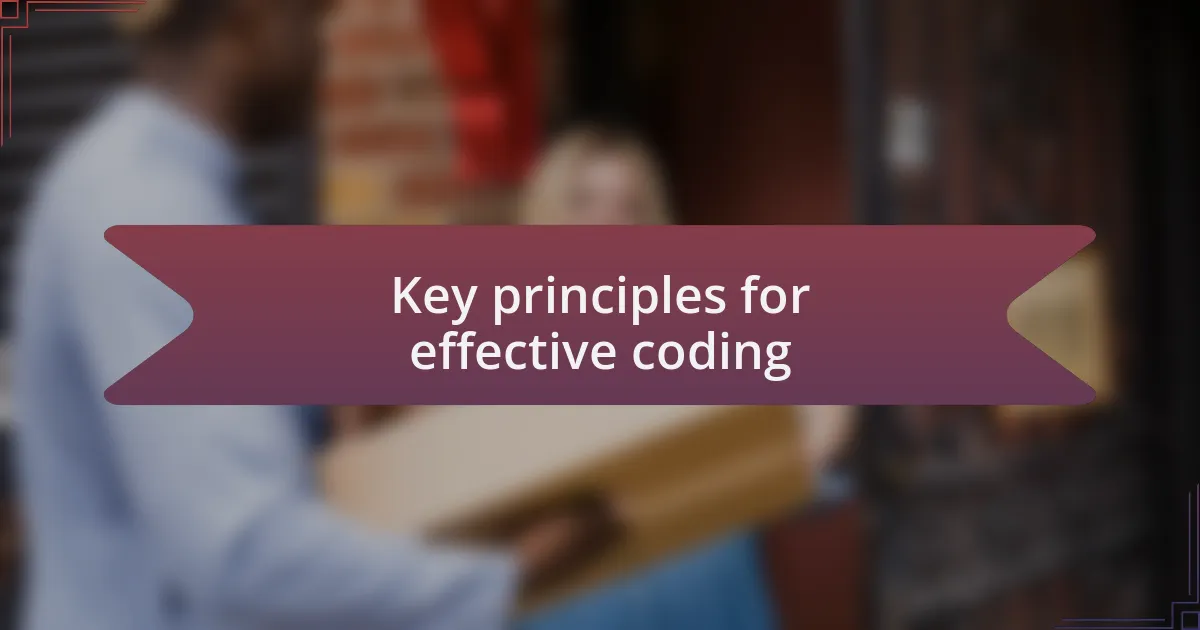
Key principles for effective coding
Effective coding hinges on a few key principles that can make all the difference in the long run. For instance, adhering to a consistent naming convention isn’t just a minor detail; it creates a common understanding among team members. I vividly recall a project where varied naming styles led to confusion, with some functions named whimsically and others more technically. It struck me—investing a little time upfront to standardize names would have saved us hours in troubleshooting down the line.
Writing modular code is another essential principle that I find pays huge dividends. By breaking down functionality into smaller, reusable components, I’ve been able to not only speed up development but also enhance code clarity. Have you ever tried to modify a monolithic piece of code? It’s like trying to change a tire on a moving car! Modular designs allow for adjustments without the risk of impacting unrelated sections, offering peace of mind when updates are necessary.
Documentation is often underestimated, but I believe it’s the backbone of maintainable code. In my experience, taking the time to document decisions, assumptions, and functionalities has helped me avoid the skepticism that arises when revisiting old projects. I once returned to a codebase I hadn’t touched in months, thankful for the comments I left behind—they transformed what could have been a frustrating scavenger hunt into a straightforward navigational guide. Don’t you agree that a little documentation can save a lot of headaches later?
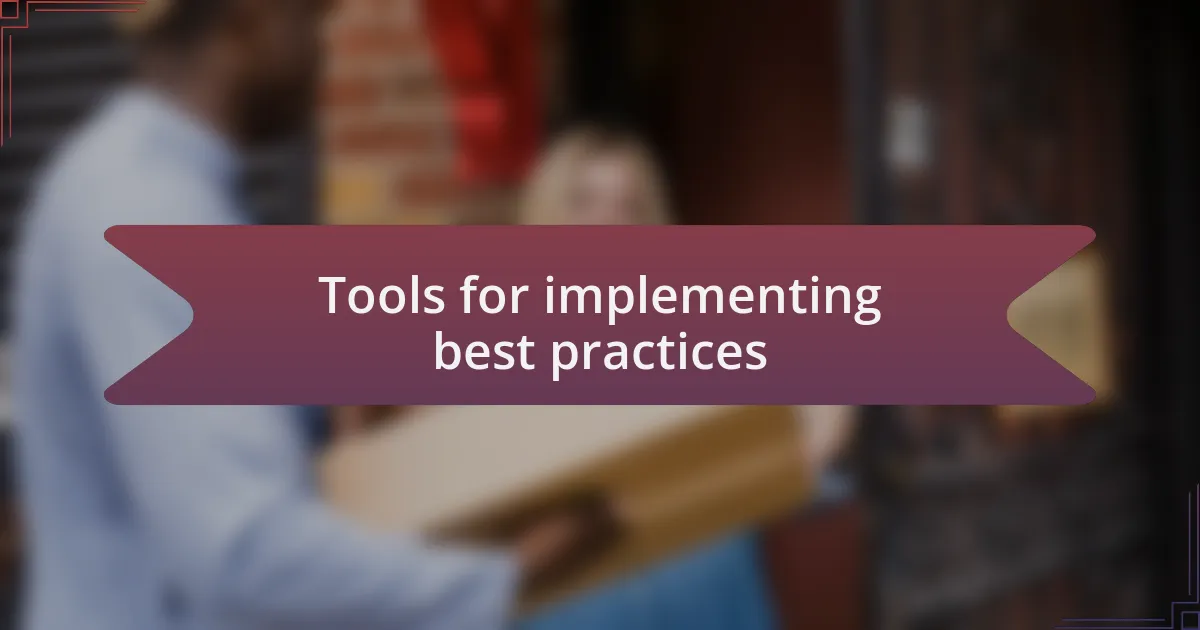
Tools for implementing best practices
When it comes to implementing best practices in coding, the right tools can make all the difference. For instance, I regularly use version control systems like Git. Using Git not only provides a safety net for my code but also fosters collaboration among team members. I once encountered a situation where a colleague accidentally overwritten crucial changes, but thanks to Git, we were able to revert seamlessly, restoring the project to its former state without a hitch. How reassuring is it to know that a reliable tool can save you from such mishaps?
Code linters are another invaluable resource for maintaining code quality. These tools analyze code for errors, stylistic issues, and potential bugs before runtime. Early in my career, I worked on a project where minor syntax errors slipped through because we hadn’t adopted a linter. It was frustrating during testing when simple mistakes caused unexpected results. Now, having integrated linters into my workflow, I find that my coding process is not only faster but way more efficient—who wouldn’t want that?
Automated testing tools hold great significance in reinforcing best practices as well. For instance, I remember a project where I decided to implement unit testing principles. Initially, it felt tedious, but the moment I ran those tests and found bugs before they hit production, I realized the value of this practice. It’s great to launch with confidence, knowing that my code has been thoroughly vetted. Isn’t it empowering to think you can catch bugs early before they impact your users?
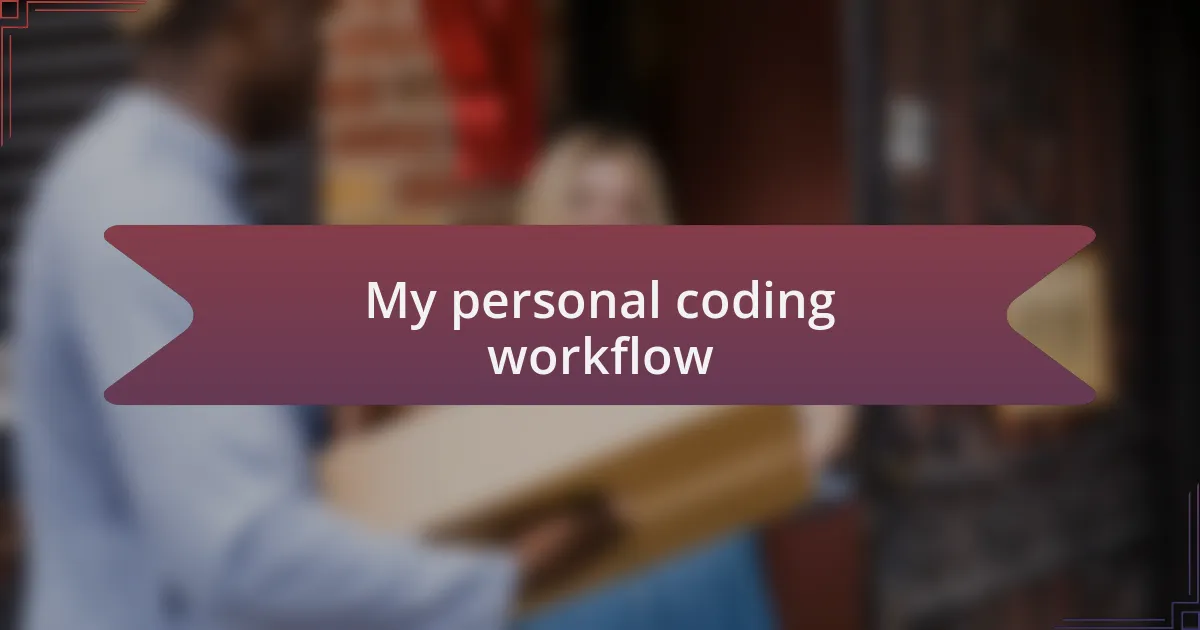
My personal coding workflow
My coding workflow is built on a solid foundation of planning and organizing. Before I even write a single line of code, I take time to sketch out the architecture of my project. For example, once, while developing a complex feature for a web application, I realized that a clear outline helped me maintain focus and direction, preventing me from getting lost in the details. Have you ever started coding only to find yourself tangled in a web of your own making? Planning can save you from that frustration.
Next, I embrace an iterative approach in my development process. Rather than trying to perfect everything all at once, I work in small increments and test as I go. I recall a sprint where I released features incrementally rather than all at once, and the feedback I received was invaluable. It allowed me to make adjustments in real-time and ultimately led to a better end product. Doesn’t it feel great to adapt based on direct input instead of waiting until the very end?
Collaboration plays a vital role in my workflow as well. I cherish the moments when I pair-program with colleagues to tackle challenging problems. This not only enhances the quality of our code but also creates an environment rich in shared knowledge and camaraderie. It’s amazing how two minds can come together to solve a problem that might stymie one person alone. Have you ever experienced that ‘aha’ moment when collaborating with someone? Those moments are truly rewarding and reinforce the value of teamwork in coding.
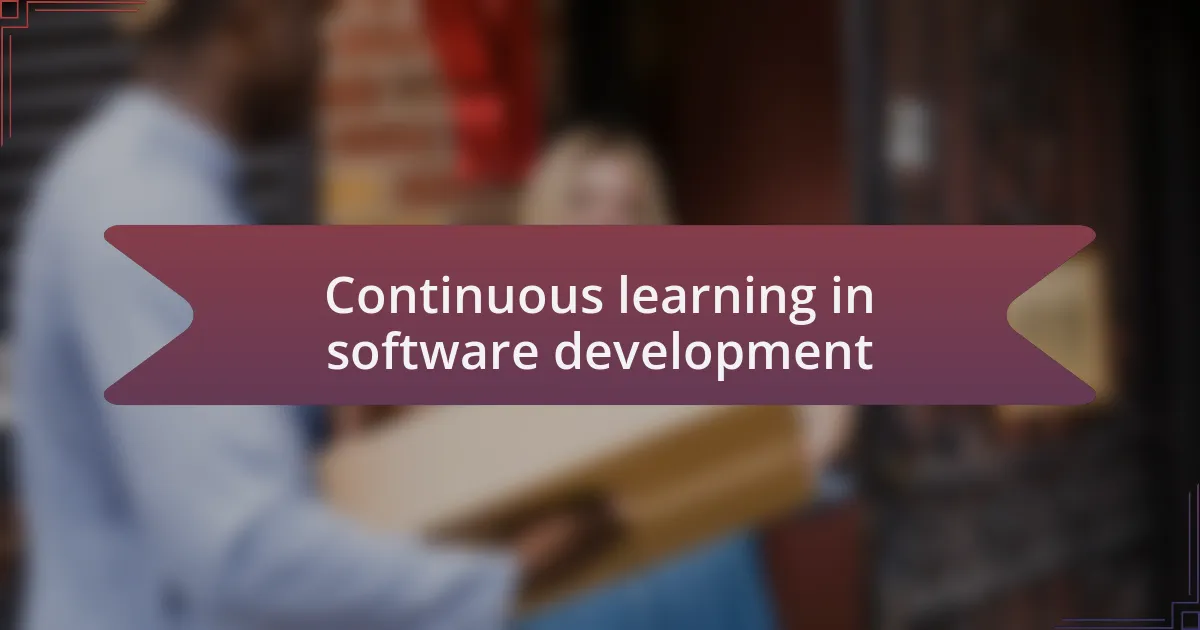
Continuous learning in software development
Continuous learning is at the heart of my growth as a developer. I remember when I first encountered a new programming language that felt entirely foreign to me. Instead of shying away, I embraced the challenge, dedicating evenings to online courses and coding exercises. That experience taught me the joy of expanding my knowledge and realizing that every new skill makes me a more versatile coder. Have you ever dived into something completely new and come out feeling invincible?
I also actively seek feedback through code reviews, understanding that they are a fantastic learning opportunity. A colleague once pointed out a more efficient way to structure my code during a review, and it transformed how I evaluate code efficiency. This incident not only improved my coding skills but also reinforced the importance of being open to constructive criticism. How do you usually respond when someone suggests changes to your work?
Staying current with industry trends is key to my continuous learning journey. I make it a point to attend webinars and conferences, both virtual and in-person. Just last year, I attended a tech talk about emerging frameworks that completely shifted my perspective on application design. Feeling the energy in the room and engaging with fellow developers was exhilarating. I often find inspiration outside of my immediate work environment – where do you seek out your inspiration?
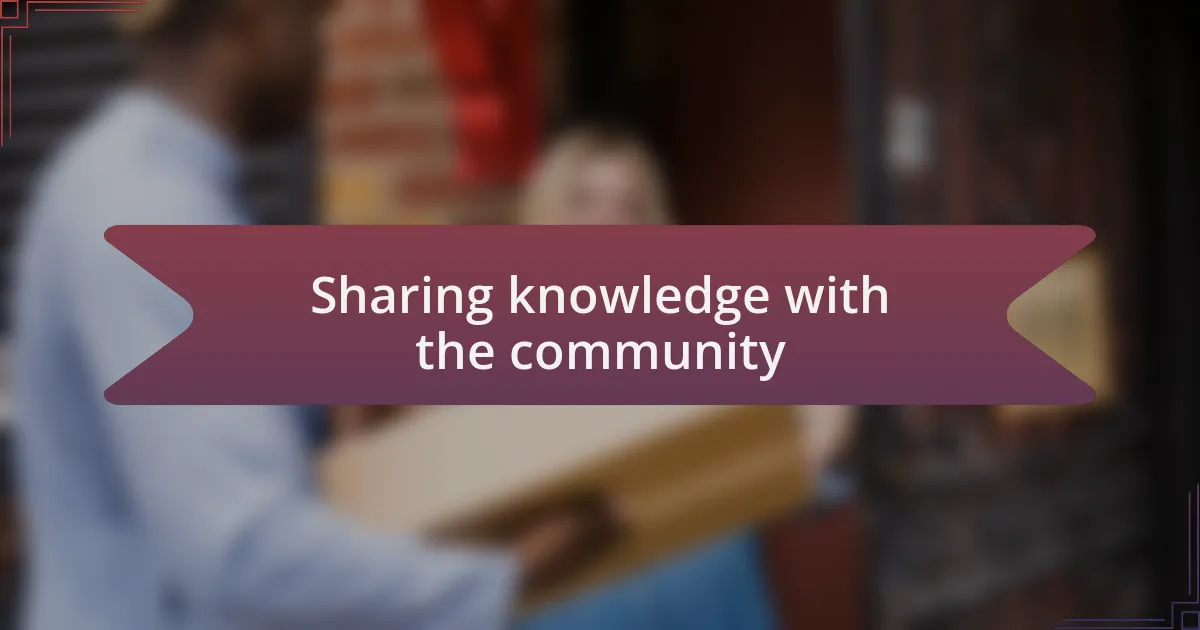
Sharing knowledge with the community
Sharing knowledge with the community has always been a passion of mine. I remember my first experience presenting at a local meet-up. Standing in front of fellow developers, sharing insights on best coding practices, I felt a mix of anxiety and exhilaration. It made me realize how powerful knowledge can be when circulated within a community. How many times have you learned something valuable from someone else’s experience?
Participating in online forums and contributing to open-source projects has also been a rewarding way for me to give back. I vividly recall a time when I responded to a question about debugging a complex piece of code. The gratitude expressed from the individual who resolved their issue reminded me of the collective growth we all benefit from. Isn’t it fulfilling to know that your experience can help someone else overcome a hurdle?
Teaching coding workshops is another avenue I’ve embraced. One unforgettable moment was when a student finally grasped a concept that had been challenging her for weeks. The look of understanding on her face was priceless and urged me to continue sharing my knowledge. It reinforced my belief that mentorship and community engagement can spark genuine passion in others. Have you ever experienced the joy of seeing someone thrive due to your guidance?